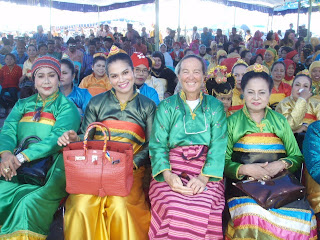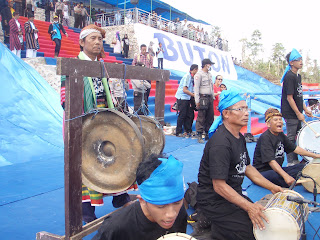YOLO was the first boat to arrive in Pasar Wajo, Buton. We were met by a flotilla of local fishing boats who accompanied us into the harbor, along with the police boat sent out to greet us and guide us in to the moorings. Quite a spectacular welcome!! We were both tired and a bit weak from bouts of Bali belly in Wakatobi, so we didn't go ashore after we got there; we indicated we wanted rest and they left us alone for the rest of the day and night.
The following morning, other boats arrived and we all went ashore late morning to be officially welcomed by the dances and ceremonies. They had us all dress in traditional costumes for the day's events and then told us that evening that the clothes were ours to keep! Wow, we're now getting a new wardrobe but will have nowhere to wear such finery. Locals explained that the striped sarongs were for women and the plaid/squares were for men. My guide got me a green top as I'd told her the day before that my favorite color was green. It was hot enough, but now we added another layer or two of clothes to spend the day in. Our shorts and t-shirts are still under the traditional dress.
YOLO at Pasar Wajo, Buton. The local Dept of Transportation had put out brand new moorings for over 20 boats just to receive the rally participants. Unlike Wakatobi, these moorings were heavy, secure and well-placed. Nice not to have to worry about the moorings as they were in 80-100' of water. One cruiser dove down to check out the setup and gave it all a thumbs up.

A row of food baskets before they are uncovered. Each of those domed baskets is heaped with plates and bowls of traditional food dishes. We were encouraged to try any and all of them.

A sample of the foods available. The blue tint is from the tarps strung overhead as sun protection and the roof.

The local Regent, the highest gov't official on Buton. He was the one responsible for the festivities and funding of all of our activities. He is keen to promote his island for tourism and he went overboard with generosity towards us rally participants.

I'm not sure why these two are next to the Regent, but there were speeches and certificates given and sashes awarded to some of the locals. We didn't get a translation of all the action; we just applauded when it seemed appropriate.

Another local in his ceremonial finery. The men all had knives (kris or keris) tucked into the sashes around their waists. The knives are sharp and the handles were all different, but I was told it was bad manners to ask to see one, so we didn't get a good picture of the different ones.

There was an entire tented area with hundreds of women weaving sarongs on these traditional wooden looms. Each woman has her own loom, and there were a few 2-person looms where larger bits of cloth were made into dresses. These sarongs are gorgeous and include every color imaginable! The plain cloth ones are for daily wear, and the ones with shiny threads and designs are for evening wear.

These are just a few of the 50+ boats that came out to welcome us. We were so busy trying to steer through them and Jason was raising our flags in tribute that we didn't get good photos. 

Karen after welcome sarong, with a local woman. The people all wanted to have their photos taken with us white folks.

One of the booths set up to welcome us. This one showed the local produce available and gave samples of the local coconut wine. "Wine" would be too kind of a word; this stuff would eat the varnish off of wood.

The blue river, a spring fed river that is near the shore where our center of operations was. Families come to splash and swim and women bring laundry to wash in this fresh water source.

The warlords and the King of Buton (2nd from left with the staff in his hand) at the ceremony. We had front row seats just like the king and his entourage!!

This woman's shoe was sparkly with mother of pearl insoles. Very fancy. I was amazed at how many women wore heels in the sand and crushed coral rock. Tough to walk in!

Another local lady wanted her picture with me. I don't understand why they want their photos with me on my camera as they'll never see the photos. The population here is 100% Muslim so the women wore the head coverings during the day. Arms and legs are covered but they don't wear the full black burkas here.

Andini, one of our guides and interpreters. Her father is the local English teacher who arranged for and trained all the guides for the cruisers. He did a fantastic job and we had the same 2 guides for our stay in Buton.

An old lady spinning thread out of kapok cotton. The thread is then used to weave the sarongs we saw everywhere. She used her toes to control the wheel; it was like having a 3rd hand for her.

The locals are trying to set me up on this loom. They needed to move some of the parts to make it long enough for me to stretch out my legs as part of the loom is supported by the feet.

The lady tried to get my hands to do what she wanted them to do, but it was not working.
We pushed the wooden sword-like piece through the middle of the layers of thread to make one line of the cloth.This step involved picking up certain threads from the middle of the loom. I had no idea what she was trying to make my fingers do, but they didn't do it well. I finally gave up and was released from the loom before I ruined her beautiful weaving job. It is a lot more complicated than I could've imagined. They take 3-5 days to weave one sarong, a week for a dress. My hat is off to these women. Many of the younger ones aren't learning the traditional ways and I'm afraid they may be lost in the next generation.
Jason admiring some of the ladies and their looms. Each loom was hand made from wood and they all had their own tools here to make sarongs.
Karen and Jason dancing to some of the music they were playing. The guides got a real kick out of seeing us dance together in this way. Most of their dancing doesn't involve touching at all. It's more like line dancing, other than the traditional ceremonial dancing.
Jason and Karen enjoying a Bintang beer at the ceremony. The population here doesn't drink alcohol and it's pretty hard to find even the beer, but the local gov't made sure there was some available for us at all the festivities here.
Karen and a Bintang beer. They had Guinness Stout in smaller bottles, too, so Jason was a happy guy.

Jason goofing off. That's our other guide, Erick, in the background. They all thought Jason was so funny.

Some of the colorful food from the dessert tables. The rainbow stuff was like hardened gelatin--different but tasty.

Each cruiser was presented with a framed certificate of appreciation for visiting Buton, signed by the head of the government, the Regent.

These next photos are from the Takawa, a display of 12,500 dancers here at Buton. It's amazing to see that many dancers in one place when that represents 10% of the entire population here. It was a magnificent spectacle and we had the best seats in the entire place. We were allowed free reign to roam the band area and to go down to the field if we wanted. Some of the cruisers were interviewed for TV along with a couple of Indonesian movie stars that attended the dance. The entire thing was broadcast live across all of Indonesia--it was a big deal!
Karen and Jason at the Takawa dance
The locals sitting behind us. They came dressed in their celebration clothes, complete with daggers in the waistbands.

Andini, Mr. Rusdi Nudi, and Erick on YOLO. They loved the boat visit and this was their first time on a yacht.

Mr. Rusdi, his daughter Andini, Karen and Erick on YOLO. These folks were our constant companions while on Buton and they were amazing! So friendly, welcoming and helpful. We went to Mr. Rusdi's home, where he also has a classroom attached that he built to help students learn and practice English. He is the local English teacher and Andini is his eldest daughter. He screened nearly 60 people who applied to be guides for rally participants and chose only those who spoke the best English and expected nothing in return. They were all volunteers and took leaves from their jobs to practice their English and be our guides. Awesome!

Our guides and their organizer in salon of YOLO. They tasted my brownies and boat cake and cookies. Andini also found me regular sliced bread here, a rarity, and sent it to me via another guide when she had to leave to go back to her university studies. These folks don't eat bread. Her father said she cried when she had to leave us, and he thanked us for helping her improve her English and self confidence. These folks will remain our friends for a long time. Erick and Mr. Rusdi both gave us a bag full of local mandarin oranges as gifts, too. Friendliness and generosity were the norm here.









































